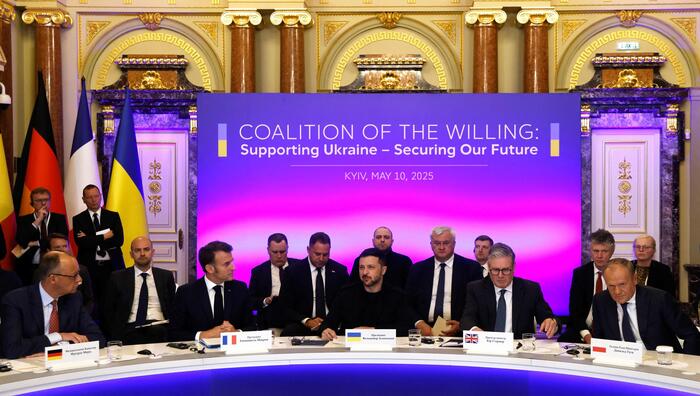The leaders of France, Germany, the United Kingdom and Poland arrived in Kyiv on Saturday to revive calls for an immediate and unconditional ceasefire in Ukraine. At the center of the discussions between France’s Emmanuel Macron, Germany’s Friedrich Merz, Britain’s Keir Starmer, Poland’s Donald Tusk and Ukrainian President Volodymyr Zelensky was the proposal for a 30-day truce as a basis for renewed negotiations.
“There is much work to be done and many issues to discuss. This war must be ended with a just peace. Moscow must be forced to agree to a ceasefire,” Zelensky’s chief of staff, Andriy Yermak, wrote on Telegram.
The initiative has received clear backing from Washington. According to Ukrainian Foreign Minister Andrii Sybiha, a “fruitful call” took place on Saturday with U.S. President Donald Trump, focused on restarting the peace process.
“Ukraine and all allies are ready for a full unconditional ceasefire on land, air, and at sea for at least 30 days starting already on Monday,” Sybiha said. He added that, if Moscow agrees, the truce could create space for genuine negotiations.
NATO Secretary-General Mark Rutte confirmed on X that he joined a videoconference on Saturday with more than 20 world leaders. “This starts with a 30-day unconditional ceasefire and must be underpinned by continued, concrete support,” he said. “We will keep supporting Ukraine in tangible ways.”
Moscow, however, has responded with hesitation. Kremlin spokesman Dmitry Peskov, in an interview with ABC News, said there are “nuances” that need to be addressed, indicating that Russia wants guarantees that Western arms deliveries to Kyiv will be halted. Peskov also cited NATO’s eastward expansion as one of the “root causes” of the conflict — a point Russian President Vladimir Putin has repeatedly raised.
Meanwhile, Trump struck a sharper tone. In a Truth Social post, the U.S. president warned that “if the ceasefire is not respected, the US and its partners will impose further sanctions” against Russia.
Since taking office in January, Trump has significantly altered the U.S. stance on the war. Kyiv and European capitals fear a potential shift in American policy that could favor Moscow. In response, EU leaders have stepped up efforts to demonstrate unity both diplomatically and militarily — a coordinated front also meant to influence U.S. policy.
“A just and lasting peace begins with a full and unconditional ceasefire. That is the proposal we are advancing with the United States,” French President Emmanuel Macron posted on X.
“Ukraine accepted [the ceasefire proposal] on March 11. Russia, however, delays, sets preconditions, plays for time, and continues its war of invasion,” he continued. “If Moscow continues to obstruct, we will step up the pressure—together, as Europeans and in close coordination with the United States. We welcome President Trump’s call to move forward in this direction.”
Later on Saturday, European Commission President Ursula von der Leyen added her voice. “The ball is now in Russia’s court. If it fails to respect the ceasefire, we are ready to impose further biting sanctions,” she wrote on X. “Our objective is clear: a just and lasting peace for Ukraine, which is vital for security and stability across our continent.”












